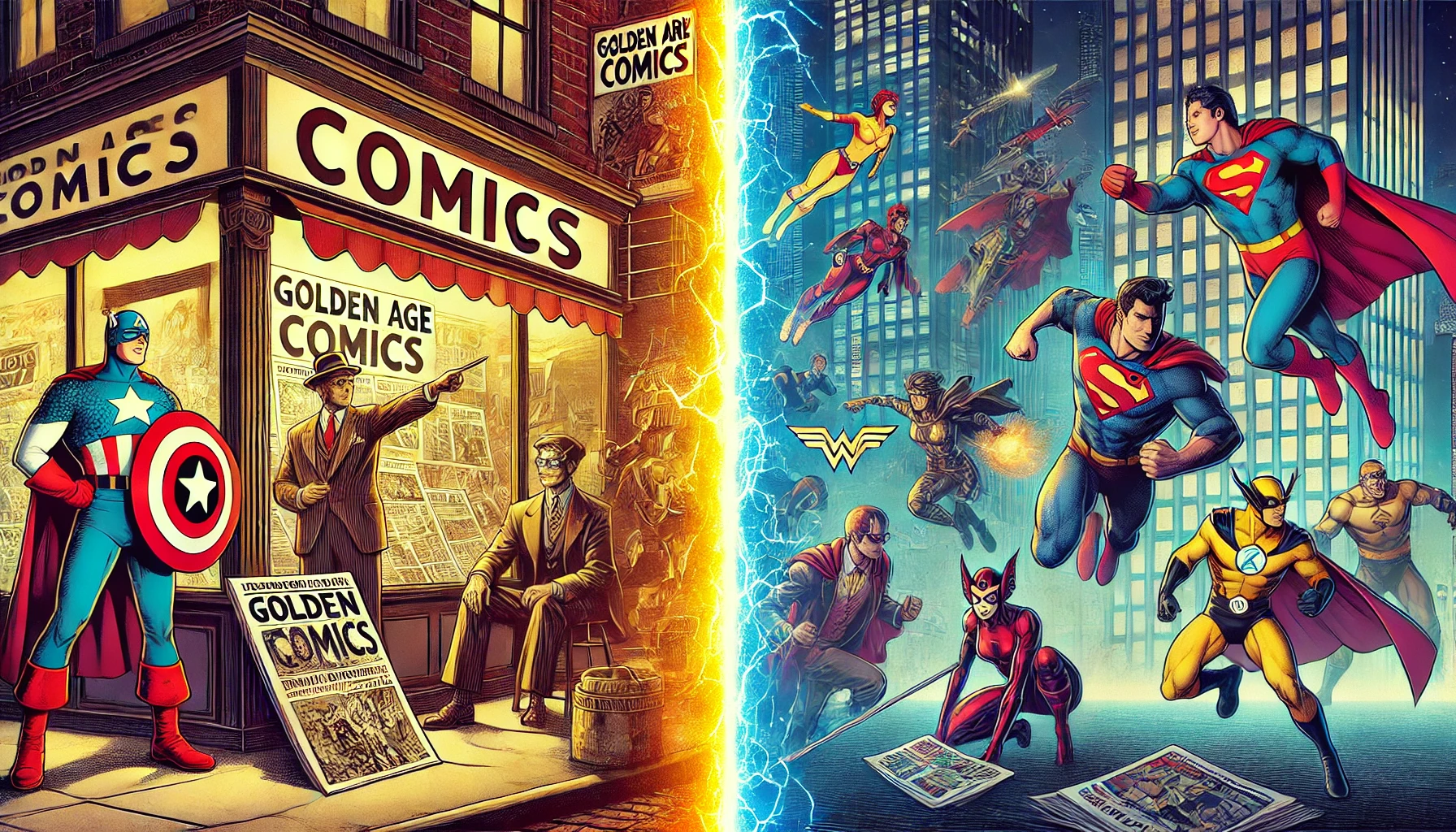Have Comics Lost Their Magic? Golden Age vs. Modern Comics

The debate over whether comic books have lost their magic and storytelling quality in the modern era compared to the revered Golden Age of Comics is one that continues to spark discussion among fans and collectors alike. To understand the argument, it’s important to explore the characteristics of both periods and evaluate the current state of the industry.
The Golden Age: A Burst of Creativity
The Golden Age of Comics, roughly spanning the late 1930s to the early 1950s, was a time of unparalleled innovation. Iconic characters such as Superman, Batman, and Wonder Woman emerged, becoming cultural touchstones. These stories were often straightforward but carried profound moral and social messages. They were accessible to readers of all ages, embodying hope, heroism, and resilience during tumultuous times like the Great Depression and World War II.
The art style was often simple yet bold, with vibrant colors and exaggerated expressions that drew readers into fantastical worlds. Creators worked under tight deadlines and with limited resources, but their passion and creativity shone through. For many fans, the Golden Age represents the epitome of imaginative storytelling, free from the commercial pressures that dominate today’s market.
The Modern Era: A Shift in Focus
Fast forward to the present, and the comic book landscape has drastically evolved. Modern comics often cater to a diverse audience, delving into complex themes such as mental health, identity, and socio-political issues. The stories are more nuanced, with layered characters and intricate plots that reflect the complexities of contemporary society. Additionally, technological advancements have elevated the art form, with hyper-detailed illustrations and innovative layouts that were unthinkable in the Golden Age.
However, some critics argue that modern comics have become too focused on catering to niche audiences and cross-media adaptation opportunities, such as film and streaming series. The influence of Hollywood is unmistakable, with many storylines feeling tailored for the big screen rather than the page. This shift has led to accusations of diluted storytelling, where commercial interests overshadow creative risks.
Comparing the Magic
So, have comics truly lost their magic? The answer may depend on one’s perspective.
- Nostalgia vs. Progress: Golden Age fans often view the era through a lens of nostalgia, cherishing the simplicity and purity of the stories. In contrast, modern comics’ evolution can be seen as progress, offering deeper engagement for readers seeking more sophisticated narratives.
- Artistic Innovation: While the Golden Age is celebrated for its pioneering spirit, modern comics have pushed the boundaries of what the medium can achieve artistically and thematically. Each era has its own “magic” tailored to its audience.
- Access and Variety: Modern comics benefit from a global marketplace and digital platforms, offering unparalleled access and variety. Yet, this abundance can sometimes dilute the perceived quality, making it harder for individual works to stand out.
The Future of Comics
The Golden Age of Comics continues to hold an almost mythical allure for its larger-than-life heroes, bold storytelling, and pioneering art that laid the foundation for the medium. The simplicity of its narratives and the vibrant creativity of its creators remain unmatched in their ability to evoke a sense of wonder and adventure. For many, these stories represent the purest essence of comic book magic—timeless and universal.
In contrast, modern comics excel in complexity and depth, offering layered narratives that reflect the multifaceted nature of today’s world. They embrace themes and art styles that challenge the traditional boundaries of the medium, catering to diverse audiences and pushing storytelling into uncharted territory. While this evolution brings a richness to the medium, it also distances itself from the unifying, almost naive charm of the Golden Age.
Ultimately, the magic of comic books lies in their ability to adapt while preserving their essence. The Golden Age may forever remain the era that captured the hearts of readers with its groundbreaking simplicity and vibrancy, but modern comics’ intricate stories and artistic ambition ensure the medium remains relevant and inspiring. Whether you’re drawn to the classic heroics of yesteryear or the nuanced tales of today, the legacy of comic books continues to thrive, offering something for every generation to cherish.
- The Mark Spears Monsters Series: Why It’s Captivating Fans
- Top 15 List of Comics Submitted to CGC for Grading (Week of January 7th, 2025)
- Have Comics Lost Their Magic? Golden Age vs. Modern Comics
- Top 10 Unbelievable Comic Book Cameos Featuring Donald Trump
- Comics are More Than Just Paper: Why First Editions Are Gold
Leave a Reply